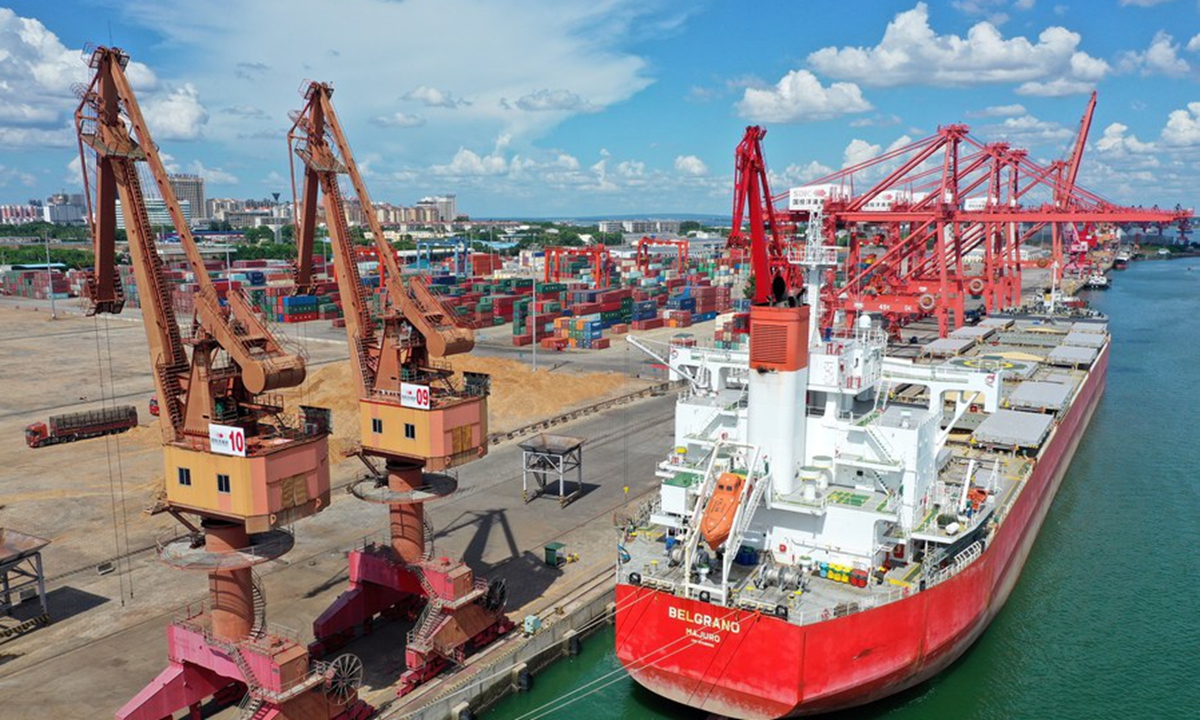
A cargo ship loaded with soya beans from Brazil prepares to unload at Yangpu port in the Yangpu Economic Development Zone in Danzhou, South China's Hainan Province, July 2022. Photo: Xinhua
The visit of Brazilian President Luiz Inácio Lula da Silva to China will boost bilateral agricultural trade, according to representatives of companies from countries that are attending the ongoing consumption exhibition in South China's Hainan Province.
Given the strong complementary relationship, Chinese experts said that agricultural cooperation has become an important engine for further rapid trade growth.
Xie Fuqi, head of Hainan Greenland-Minerva Food Trading Co, the first joint venture (JV) between Chinese and Brazilian beef companies, expected the visit to offer a significant boost to agricultural trade, not only in beef products.
Xie spoke on Tuesday on the sidelines of the third China International Consumer Products Expo (CICPE), which kicked off in Haikou, South China's Hainan Province on Monday and lasts until Saturday.
Minerva is one of Brazil's three major beef packers. The JV was registered in Hainan Province in January 2022, taking advantage of the free trade port's duty exemption on frozen food. Last year, the company imported 10,000 tons of Brazilian beef worth 300 million yuan ($43.57 million) to 400 million yuan.
"The visit might also pave the way for allowing exports of byproducts of Brazilian beef to China, such as ox tripe, omasum, beef kidneys and ox hearts," said Xie.
Brazilian agricultural companies are increasingly interested in building closer ties with the Chinese market.
Take Minerva as an example. One reason it chose to form a JV with a Chinese partner, instead of using the bulk commodity direct export model, is because "it looks to further deepen its footprint in China and communicate directly with Chinese consumers based on sales channels and supply chains provided by Greenland," Xie noted.
Brazilian President Luiz Inácio Lula da Silva will visit China from Wednesday to Saturday, with a delegation of businesspeople and officials, and it is widely believed that economic cooperation will be a key topic during the visit.
At the third CICPE, other Brazilian agricultural products such as coffee have also drawn flocks of Chinese consumers.
Niu Wei, an executive of Brazil Yisi Import Export, which sells Brazilian and other Latin American coffee beans to the Chinese market, told the Global Times that business has grown 40 percent year-on-year to date, and it is expected to bounce back to the pre-pandemic level by the end of this year.
"Coffee acceptance in China has improved a lot, with young consumers willing to try and buy beans from new emerging producers such as Brazil and Colombia, which opens the market wider," Niu said.
China has the most promising consumer market for agricultural products in the world, while Brazil is one of the most important exporters of agricultural products in the world.
The two countries have highly complementary agricultural cooperation, showing big potential in bilateral trade, Jiang Shixue, a professor at the Center for Latin American Studies at Shanghai University, told the Global Times on Tuesday.
China has been Brazil's largest trading partner for 14 consecutive years. In 2022, bilateral trade reached $171.49 billion, up 4.9 percent from the previous year, Chinese customs data showed.
Brazil is China's largest source of imports of soybeans, chicken and sugar. Important farm products such as corn have also achieved rapid growth in exports to China during recent years.
In a note sent to the Global Times, COFCO Corp, China's largest grain trader and food producer by sales revenue, said that the introduction of high-quality Brazilian agricultural products to China helps Brazilian farmers and satisfies China's domestic demand, achieving mutual benefit and win-win results.
The group said that it has imported 34 million tons of agricultural products from Brazil with a total value of $19 billion in the past three years, and has maintained a growth trend.
Xie from the beef JV said that the venture plans to launch more tailor-made products in the Chinese market, such as raw cut steak and ready-to-cook products. The JV will also consider imports of other meat such as chicken.
"China is the largest export market for Brazilian beef and also the latter's largest trading partner. Brazilian beef accounts for nearly half of the import market," Xie said.




